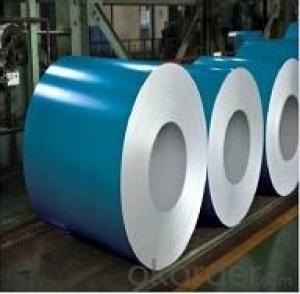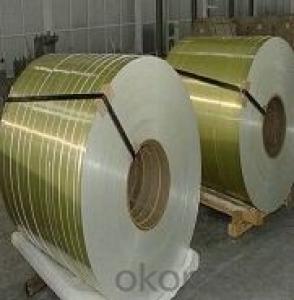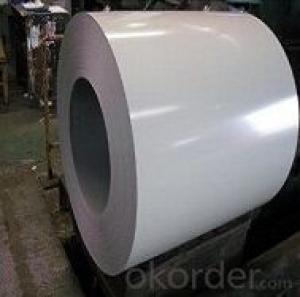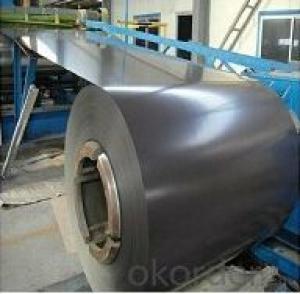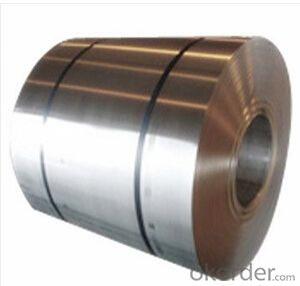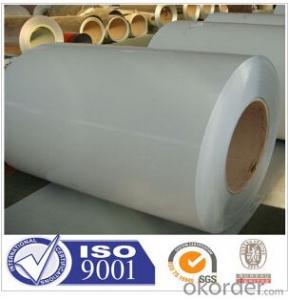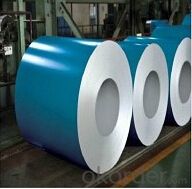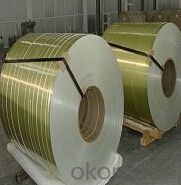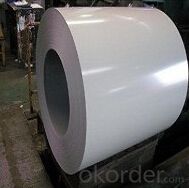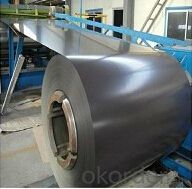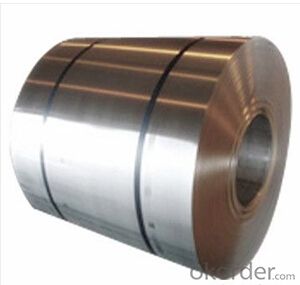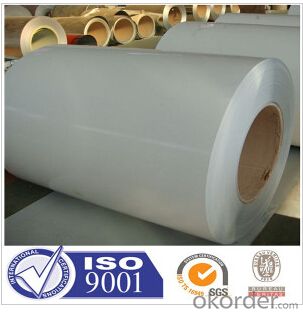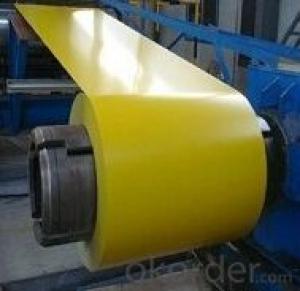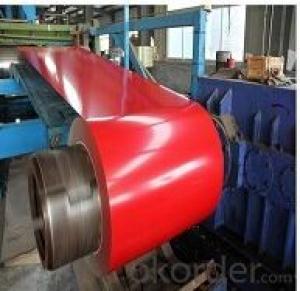0.12mm~1.3mm Prepainted Galvanized Steel Coil for Constructions
- Loading Port:
- Shanghai
- Payment Terms:
- TT OR LC
- Min Order Qty:
- 25 m.t.
- Supply Capability:
- 10000 m.t./month
OKorder Service Pledge
OKorder Financial Service
You Might Also Like
Basic Info.
Model NO.:MLK-2015157
Surface Treatment:Coated
Certification:ISO, SGS, BV, RoHS, IBR
Technique:Cold Rolled
Standard:ASTM, JIS, GB, AISI, DIN, BS
Application:Construction Material
Edge:Mill
Stock:Stock
Steel Grade:Dx51d, SGCC, Sgch, A653, Dx52D, Dx53D
Place of Origin: China
Width:600mm-1500mm
Thickness:0.13mm-0.8mm
Length:Customered
Delivery Time:15-30 Days
Zinc Coating:30-275G/M2
Top Color Coating:10-25
Bottom Color Coating:7-10
ID:508mm
Export Markets:South America, Eastern Europe, Southeast Asia, Africa, Oceania, Mid East, Eastern Asia
Additional Info.
Trademark:MALIKE OR OEM
Packing:Standard Seaworthy, Export Packing
Standard:AISI, ASTM, BS, DIN, GB, JIS
Origin:Shandong, China
HS Code:7210700000
Production Capacity:700mt/Day
| NAME | GALVANIZED | GALVALUME/ALUZINC | PPGI/PPGL |
| MODEL NO. | (0.13-1.2)mm*(600-1250)mm | ||
| TYPE | steel coil, steel sheets/ plates, corrugated steel sheets/plates | ||
| TECHNIQUE | Hot rolled-cold rolled-galvanized | hot rolled-coldrolled-galvalume /Aluzinc | Hot rolled-cold rolled--galvalume/galvanized - PPGL/PPGI |
| SURFACE TREATMENT | Mini/regular/ big/zero spangle, ,Chromate treatment/ chromate-free treatment/ untreated Unoile/ oiled ,TENSION LEVELLERT SKIN PASS anti-fingerprint/Un-anti-fingerprint, coating | Polyester(PE),Silicone Modified(SMP),Acrylic (AC), Polyurethane(PU)PVC Plastisol(PVC plastisol can be embossed to versatile texture)etc | |
| APPLICATION | Guardrails, ventilation ducts, gutters and down spouts, Pre-paint and post paint applications, gutters and down spouts, ceiling suspension bars, shutter door rails. Auto parts, electrical appliances, refrigerator appliances, signs, automotive parts,vending machines, washing machines, showcases and other structural use, roofing, commercial use | Gutters, auto parts, electrical appliances, vending machines, refrigerators, ovens, for pre-paint. structural use, roofing, commercial use etc | Electrical appliances, roofing, partitions. Factory buildings, elevator panelsetc Special applications: wear resistant steel, high-strength-steel plate |
- Q: what is magnetic steel used for and if it can be used for producing kitchenwares utenils like stainless steel basines,mugs and bowls.
- Magnetic steel rusts. That's why kitchenware is often made out of stainless. You can't turn magnetic steel into stainless, sorry. Metalurgy is a complicated subject, and is all about different alloys. It's far too involved to explain in a few paragraphs here, but no, they're not interchangeable in this case unless you want to produce kitchenware that rusts.
- Q: What are the dimensions of steel coils used in the metal furniture industry?
- The dimensions of steel coils used in the metal furniture industry can vary depending on the specific application and requirements. However, common dimensions for steel coils used in this industry range from 0.5mm to 3mm in thickness and 600mm to 2000mm in width.
- Q: How do steel coils contribute to the renewable energy sector?
- Steel coils contribute to the renewable energy sector in several ways. Firstly, steel coils are used in the manufacturing of wind turbines. The towers of wind turbines are made of steel, and steel coils are used to fabricate the structural components of these towers. The high strength and durability of steel coils make them ideal for withstanding the harsh environmental conditions in wind farms. Moreover, steel coils are also used in the production of solar panels. Steel is used to create the frames and support structures that hold the solar panels in place. These frames need to be strong enough to withstand wind and weather conditions, and steel coils provide the necessary strength and stability. Furthermore, steel coils are used in the construction of transmission lines that carry electricity generated from renewable sources. Steel is widely used for the poles and towers that support these transmission lines, as it provides the necessary strength to bear the weight of the cables and withstand extreme weather conditions. In addition, steel coils play a crucial role in the manufacturing of energy storage systems. Renewable energy sources such as wind and solar are intermittent, and energy storage systems help to store surplus energy for later use. Steel coils are used in the fabrication of battery enclosures and racks, ensuring the safety and stability of these systems. Overall, steel coils contribute significantly to the renewable energy sector by providing the necessary strength, durability, and stability for various infrastructure components. Their use in wind turbines, solar panels, transmission lines, and energy storage systems helps to support the growth and development of renewable energy sources, making them an integral part of the transition towards a greener and more sustainable future.
- Q: What are the different steel coil finishes available?
- There are several different steel coil finishes available, including hot rolled, cold rolled, galvanized, and coated finishes.
- Q: I need to penetrate steel on my car but don't know which bit to use. Are there special bits for steel?
- Yes, they'll be marked HSS, High Speed Steel.
- Q: How are steel coils inspected for chemical composition using spectroscopy?
- Steel coils are inspected for chemical composition using spectroscopy by using a technique called laser-induced breakdown spectroscopy (LIBS). In LIBS, a high-energy laser beam is directed onto the surface of the steel coil, causing a small portion of the material to vaporize and form a plasma. The plasma emits characteristic light that is unique to the elements present in the steel. This emitted light is then analyzed by a spectrometer, which separates the light into its individual wavelengths and measures their intensities. By comparing the intensities of the emitted light to known reference spectra, the chemical composition of the steel coil can be determined accurately and efficiently.
- Q: How are steel coils inspected for quality assurance?
- Quality assurance for steel coils involves a rigorous process that includes various tests and checks to ensure their quality. Initially, a visual inspection is carried out to identify surface defects like scratches, dents, or rust, ensuring the coils are in good condition and free from obvious flaws. Afterward, a dimensional inspection is performed to verify the coils' dimensions and tolerances. This involves measuring their width, thickness, and length to ensure they meet the specified requirements. Any deviations from the standard dimensions are noted and addressed. Moreover, mechanical testing is conducted to assess the strength and durability of the steel coils. Tensile tests are performed to measure their strength and elasticity, while impact tests evaluate their ability to withstand sudden loads or shocks. Furthermore, chemical analysis is undertaken to determine the composition and purity of the steel. Samples are taken from the coils and analyzed in a laboratory to check for impurities or elements that could affect the quality. To comply with industry standards, non-destructive testing methods like ultrasonic testing or magnetic particle inspection may be used. These methods can detect internal defects or irregularities that may not be visible to the naked eye. Additionally, surface treatment inspections, such as galvanization or coating checks, may be performed to ensure the protective layers are applied correctly and meet the necessary specifications. In summary, the quality assurance process for steel coils includes visual, dimensional, mechanical, chemical, and non-destructive testing methods. These thorough inspections guarantee that the steel coils meet the required quality standards and are suitable for their intended applications.
- Q: What is the maximum stacking height for steel coils?
- The maximum stacking height for steel coils depends on various factors such as the size and weight of the coils, as well as the strength and stability of the storage facility. Generally, it is recommended to stack steel coils up to a height of 3 to 5 coils, ensuring proper weight distribution and stability to prevent damage or accidents.
- Q: I need to say how a bottle opener is made, would it be made from steel and can this be coloured? How?
- Steel can be plated(Chrome),Blackened(Black Oxide),Powder coated(color of your choose).All of this is done to prevent rust.All of these aforementioned processes can be worn off through being used.I suggest polished Stainless steel.
- Q: What are the factors that affect the quality of steel coils?
- The quality of steel coils can be influenced by various factors. To begin with, the composition of the steel itself plays a vital role in determining its quality. Impurities like sulfur or phosphorus can have a negative impact on the strength, durability, and overall performance of the steel. Additionally, the quality of the steel is affected by its carbon content, alloying elements, and heat treatment. Furthermore, the quality of the steel coils is greatly affected by the manufacturing process and techniques utilized during production. Factors such as the cleanliness of the production environment, the precision of the rolling and cooling processes, and the control of temperature and pressure throughout manufacturing all contribute to the final quality of the coils. Additionally, the surface quality of the steel coils is a crucial factor. Any defects or imperfections on the surface, such as scratches, dents, or corrosion, can compromise the integrity and functionality of the coils. It is essential to handle, store, and transport the coils properly to maintain their surface quality. Moreover, the mechanical properties of the steel coils, including tensile strength, yield strength, and elongation, are essential indicators of their quality. These properties depend on various factors, such as the type of steel, its thickness, and the processing conditions. Lastly, external factors such as environmental conditions, like humidity and temperature, can affect the quality of steel coils. Exposure to moisture or extreme temperatures can lead to corrosion or other forms of degradation, impacting the overall quality and lifespan of the coils. In conclusion, the quality of steel coils is influenced by several factors, encompassing the composition of the steel, the manufacturing process, surface quality, mechanical properties, and external environmental conditions. It is crucial to carefully control and monitor these factors to produce high-quality steel coils that meet the desired specifications and standards.
Send your message to us
0.12mm~1.3mm Prepainted Galvanized Steel Coil for Constructions
- Loading Port:
- Shanghai
- Payment Terms:
- TT OR LC
- Min Order Qty:
- 25 m.t.
- Supply Capability:
- 10000 m.t./month
OKorder Service Pledge
OKorder Financial Service
Similar products
Hot products
Hot Searches
Related keywords
